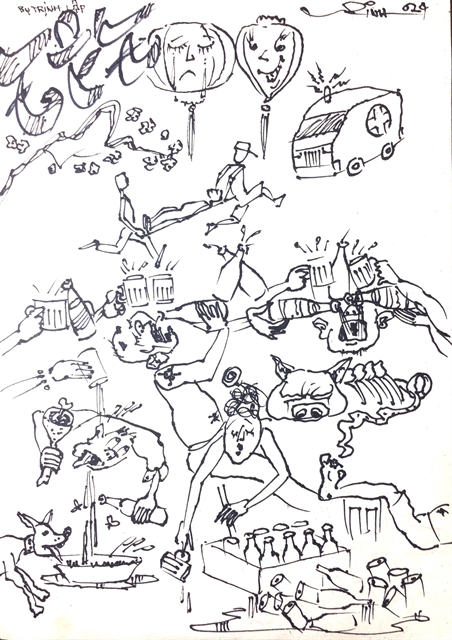 Talk Around Town
Talk Around Town

 |
| Illustration by Trịnh Lập |
by Nguyễn Mỹ Hà
As much as we love the Lunar New Year holiday, or Tết in Vietnamese, there are issues with the way we celebrate it that need to be tweaked so that it is a celebration of joy, and not too burdensome or overwhelming.
A popular video went viral online with an Australian speaking in Vietnamese. "Let's go home to Australia. We do drink for the New Year, but only one day, but here in Việt Nam, drink is every day for a week. It's too much!" he said
This drinking culture is a troubling side of Tết when you visit your extended family, or they visit you, and toast to prosperity, longevity and happiness.
This year, police departments across the country heightened their checkpoints, if you were positive for any level of alcohol, you had to pay a fine. No excuses.
"If you drink, don't drive!" has become not only the motto of a publicity campaign on national TV, and people have also been more understanding before offering a boozy toast.
This year, the police reported a significant decrease in the number of drink-driving deaths over the Tết holiday. A special Tết report from the Ministry of Health saw traffic accident emergency cases down by 12 per cent, suspected traffic-related hospital cases down by 8.4 per cent, and road accidents down by 22.4 per cent.
These numbers mean less pressure on the health service; if drink-driving can be brought under control, then more people will survive.
Nearly 30,000 drivers were stopped and fined for their blood alcohol level. Traffic police had to work hard, so that health workers in hospitals got some relief.
Drink-driving will always be dangerous. Even as a drunk passenger on the back seat of a motorbike, you can easily fall off your bike. One of my high school friends lost her husband that way in a distant Tết.
This threat is a concern in colder climates, from Huế and northward, especially in the mountains, where people distil their own rice or maize alcohol, and no public transportation is available to carry you from one mountain to the next. A popular sight you might see is a woman who puts her drunk husband on the back of a horse and both the woman and horse walk home over the mountains.
Tết in the South is when people travel after they prepare an abundant tray of food, fruits and offerings to their ancestors. But in other places further north, you'd have to cook meals for your ancestors every day, then try your best to eat up all the food, which is neither delicious nor pleasant. Some age-old families in Huế may have 10 altars for different ancestors. Cooking, serving then cleaning and consuming the food on such occasion is no easy task.
As we love our traditions and want to keep them, we must say that the North and its people tend to brag about their thousand-year-long history. But there are sometimes issues.
For my northern side of the extended family, the men tend to be scholarly, self-righteous and sarcastic, not only of others but mostly of themselves. Their comments tend to be innocent and without any ill intention, but they say it so straightforwardly it can hurt other people's feelings. And once you feel hurt while drinking, it can go awry. As we say, "hòn bấc ném đi, hòn chì ném lại," or "if you throw something light at someone, they might throw a heavy piece of lead back."
There tends to be drama at family gatherings, especially at an ancestor's death anniversary or during Tết.
The sequence goes as follows: the extended family has not seen each other for a long time, they are happy to meet, but start to drink and feel they have to say something that's been up in their mind, something they normally wouldn't say, if they had not had a drink. Distant cousins start reacting differently to how they would if they had not had a drink. Before you know it, there is some sort of quarrel, or fight, or people getting angry with each other. People sometimes storm off and leave.
Going back home on a motorbike drunk and feeling hurt is not healthy in any conditions or culture. Enjoy Tết, but do not let it drink you. Bottoms up.
Having written all this, I am reminded that on the fifth day of Tết some 20 years ago, awaiting labour in the hospital, I heard cheers from the neighbouring room, where the staff were toasting on the first day back to work. I heard cheers and laughter, but I was deadly scared that if there was any complication with the birth, the doctors and nurses might not be able to see straight to perform vital medical procedures!
It was a roller-coaster ride back then, but would be unlikely to happen now, as it is illegal to drink at work today. VNS




